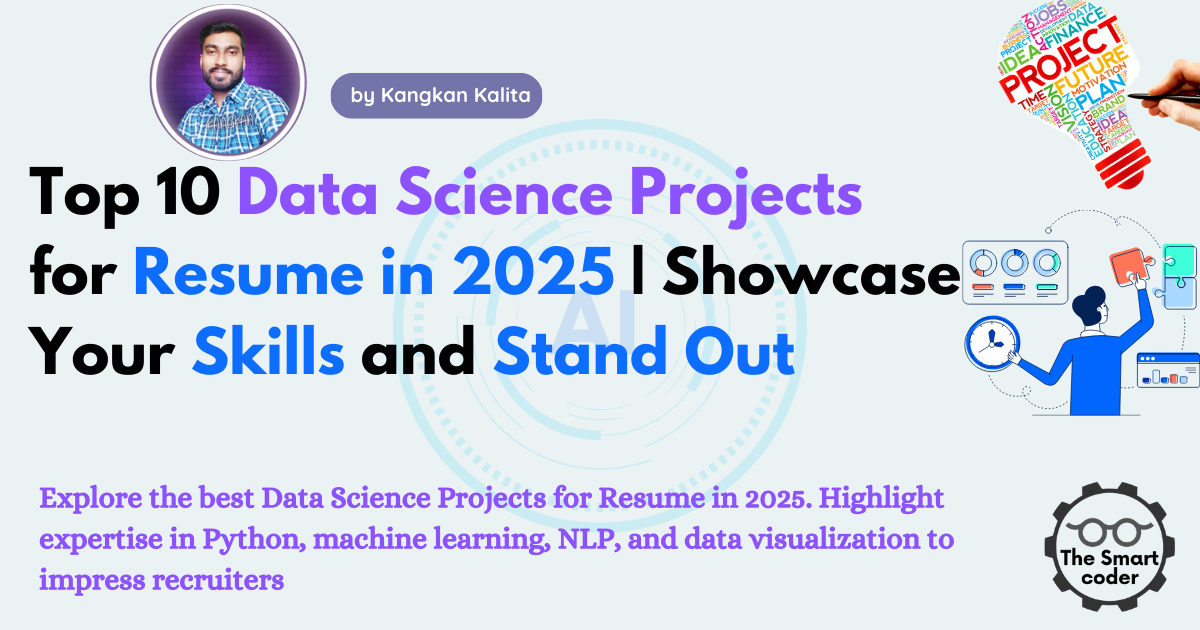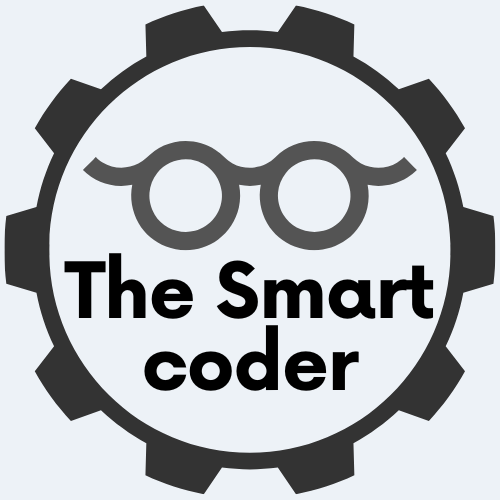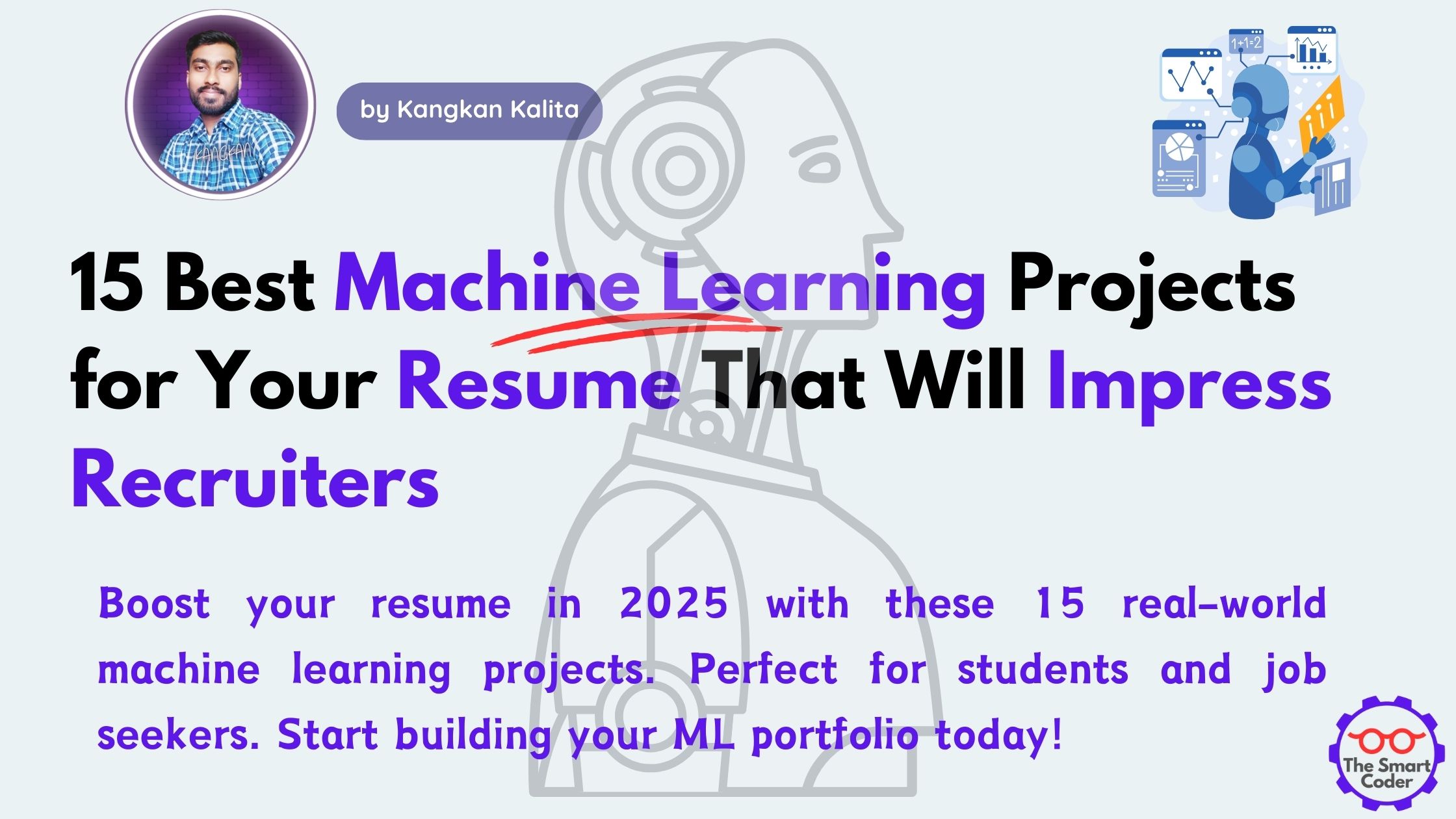Data Science Projects for Resume

In today’s competitive job market, having theoretical knowledge in data science isn’t enough. Recruiters look for proof of your skills, and nothing does this better than real-world projects. Including well-documented data science projects for resume can set you apart from the crowd and demonstrate your ability to tackle practical problems.
Let’s explore how to choose and present data science projects to make your resume shine.
Why Data Science Projects Matter for Your Resume
Demonstrating Your Technical Expertise
Projects are an excellent way to showcase your command over tools, algorithms, and frameworks. They act as tangible proof of your skills.
Proving Problem-Solving Skills
By solving real-world problems through your projects, you display your analytical thinking and ability to deliver results.
Making Your Resume Stand Out
In a sea of resumes, a well-presented project portfolio catches the recruiter’s attention and leaves a lasting impression.
Key Components of a Data Science Project
Every impactful data science project should include the following:
- Problem Definition and Objectives: Clearly outline the problem and what you aim to achieve.
- Dataset Collection and Cleaning: Ensure your dataset is accurate, relevant, and free of inconsistencies.
- Analysis and Model Building: Use appropriate algorithms to analyze data and build predictive models.
- Visualization and Insights: Present your findings using graphs, dashboards, or reports.
- Documentation and Presentation: Maintain clear documentation to explain your process and results.
Best Data Science Projects for Your Resume
Beginner-Level Projects
- House Price Prediction
- Use regression algorithms to predict house prices based on features like location, size, and amenities.
- Tools: Python (Scikit-learn), Excel
- COVID-19 Trend Analysis
- Visualize the trends in COVID-19 cases, recoveries, and deaths using publicly available datasets.
- Tools: Tableau, Matplotlib
Intermediate-Level Projects
- Twitter Sentiment Analysis
- Perform sentiment analysis on Twitter data to classify tweets as positive, negative, or neutral.
- Tools: Python (NLTK, TextBlob), Pandas
- Movie Recommendation Engine
- Build a collaborative filtering-based recommendation system to suggest movies to users.
- Tools: Python, Scikit-learn
Advanced-Level Projects
- Image Classification Using CNN
- Use convolutional neural networks (CNNs) to classify images into categories.
- Tools: TensorFlow, Keras
- Stock Price Prediction
- Analyze historical stock data and predict future prices using time series analysis.
- Tools: Python, ARIMA models
Some Other Important Projects to Consider:
Here’s a list of 10 impactful projects you can showcase on your resume in 2025 to stand out as a data scientist. These projects highlight key skills and tools that align with industry expectations:
1. Image Classification Using Deep Learning (TensorFlow/PyTorch)
- Skills: Convolutional Neural Networks (CNNs), deep learning, computer vision
- Description: Built a deep learning model to classify images into predefined categories. Achieved high accuracy using transfer learning with pre-trained models.
2. Natural Language Processing (NLP) for Sentiment Analysis (Python)
- Skills: NLP, text preprocessing, sentiment scoring, machine learning
- Description: Developed an NLP pipeline to analyze customer sentiments from online reviews. Used techniques like TF-IDF and word embeddings for text classification.
3. Recommendation System for E-Commerce (Python/R)
- Skills: Collaborative filtering, content-based filtering, recommendation algorithms
- Description: Created a recommendation system to suggest products based on user behavior and preferences. Improved recommendation accuracy using hybrid methods.
4. Fraud Detection Using Machine Learning (Python)
- Skills: Classification algorithms, anomaly detection, imbalanced datasets
- Description: Built a machine learning model to detect fraudulent transactions in a financial dataset. Used SMOTE for handling class imbalance and achieved high precision.
5. Big Data Processing with Apache Spark
- Skills: Big data, Spark, distributed computing, PySpark
- Description: Processed and analyzed large datasets using Apache Spark. Optimized data pipelines and extracted actionable insights efficiently.
6. Time Series Forecasting with LSTM (Python)
- Skills: Time series analysis, deep learning, recurrent neural networks (RNNs)
- Description: Developed a Long Short-Term Memory (LSTM) model to forecast stock prices. Leveraged historical trends and achieved accurate predictions.
7. Exploratory Data Analysis (EDA) on Real-World Dataset (Python/R)
- Skills: Data visualization, statistical analysis, hypothesis testing
- Description: Conducted a thorough EDA on a real-world dataset (e.g., healthcare or finance). Generated insights to inform business decisions through compelling visualizations.
8. Object Detection Model (YOLO or Faster R-CNN)
- Skills: Object detection, deep learning, computer vision
- Description: Developed an object detection model to identify and classify objects in images. Used YOLO for real-time detection with high precision.
9. Healthcare Data Analysis with Predictive Modeling
- Skills: Data analysis, predictive analytics, logistic regression, XGBoost
- Description: Built a predictive model to identify risk factors for a medical condition. Applied data preprocessing and advanced analytics for actionable insights.
10. End-to-End Data Science Pipeline (From Data Collection to Deployment)
- Skills: ETL, model development, deployment, Flask/Django, cloud platforms
- Description: Designed a complete data science solution, from collecting and cleaning raw data to deploying a machine learning model as a web application.
Bonus Tips for Resume Presentation:
- Quantify Results: Highlight metrics like accuracy, precision, or cost/time savings achieved through your projects.
- Showcase Tools: Mention specific libraries, frameworks, or tools (e.g., TensorFlow, PyTorch, SQL, AWS).
- Contextualize: Briefly describe the problem you solved, your approach, and the impact of your work.
Let me know if you’d like assistance with any specific project descriptions or a more tailored approach to presenting your work!
How to Choose the Right Projects for Your Resume
- Relevance to Job Roles: Tailor your projects to match the requirements of the roles you’re applying for.
- Showcasing a Variety of Skills: Include projects that cover diverse areas like machine learning, visualization, and analysis.
- Selecting Industry-Relevant Datasets: Use datasets from domains like healthcare, finance, or e-commerce for better impact.
Tools and Technologies to Use
Here are the tools you can use to create professional data science projects:
- Python and R: For data manipulation, analysis, and visualization.
- SQL: To query and manage databases.
- Tableau and Power BI: For creating dashboards and visualizing insights.
Tips for Presenting Projects on Your Resume
- Structure the Project Description: Include problem statement, approach, tools, and outcomes in your description.
- Highlight Results and Tools Used: Focus on the impact of your work and the technologies involved.
- Add Links to Project Repositories: Provide GitHub or portfolio links for recruiters to explore your work.
Mistakes to Avoid
- Overcomplicating Your Projects: Keep your project simple yet impactful.
- Neglecting Documentation: Always document your process clearly and concisely.
- Including Incomplete Projects: Only list projects that are fully implemented and tested.
Benefits of Data Science Projects for Career Growth
- Building Confidence Through Hands-On Experience: Projects give you a chance to apply your theoretical knowledge in a practical setting.
- Networking Opportunities via Shared Projects: Sharing your projects on platforms like LinkedIn can open networking doors.
- Standing Out in Job Interviews: A strong portfolio helps you showcase your strengths during interviews.
Creating and presenting the right data science projects for your resume is crucial for freshers and professionals alike. They not only enhance your skillset but also demonstrate your problem-solving abilities to potential employers. Start with beginner-friendly projects, gradually move to advanced ones, and document them well to make your resume a standout.
FAQs
1. What are the best tools for data science projects?
Python, R, SQL, Tableau, and Power BI are some of the best tools for data science projects.
2. How many projects should I include on my resume?
Include 3-5 impactful projects that showcase diverse skills and techniques.
3. Can I use online datasets for my projects?
Yes, platforms like Kaggle, UCI Machine Learning Repository, and Google Datasets offer free datasets.
4. How do I choose projects relevant to my skills?
Pick projects that align with your skills and the job role you’re targeting.
5. Are certifications necessary along with projects?
Certifications are not mandatory but can add value to your resume by validating your knowledge.






